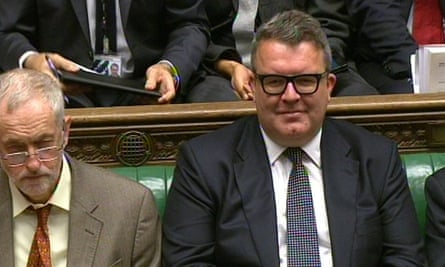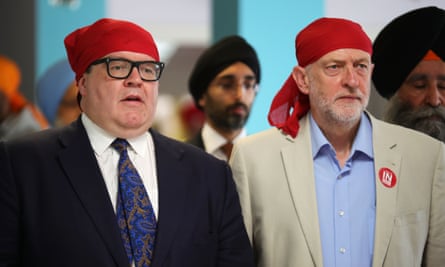One of the many surprises of post-Brexit politics has been the cull of big personalities. Practically overnight, Westminster’s most vivid characters – from the Notting Hill set to Nigel Farage – vanished. One of the few recognisable names still left on Labour’s front bench is Tom Watson, whose charismatic reputation and geeky glamour should therefore elevate him to celebrity status in this colourless new political landscape. But ever since the early hours of 24 June, Labour’s deputy leader has retreated behind a blank facial glaze so opaque as to render him completely inscrutable.
When appearing beside Jeremy Corbyn, he wears an expression normally reserved for funerals, which of course only makes me all the more curious to know what he is thinking. I ask about his thoughts while he watched Theresa May demolish Corbyn at her first prime minister’s questions, and he starts to chuckle.
“Well, at PMQs I always try to get myself into a Buddha-like state. I try not to have any facial expression at all. Because if I laugh at a Jeremy joke, two hours later on social media it’s either interpreted as me laughing at Jeremy, or laughing at an opposition joke. Or, if I scowl at something someone says, people are accusing me of scowling at Jeremy. So I try to keep a straight face, which everyone always interprets as me looking really sad and miserable. That’s actually not the case. I’m generally just trying to remain expressionless.”

Watson does a good job at keeping it up for most of this interview, too. When we speak before the high court ruling on Labour’s leadership contest, the detached serenity he affects is disconcertingly implausible. But, as he points out several times, he will have to serve as deputy to whichever leader his party elects. “I’m 50 next year, so I’ve learned not to worry about the things you’ve got no control of. I’ve not really been in control of events in the last few weeks, and if I can’t control events, I can’t worry about them.”
He certainly did not predict them. Watson had no idea that Labour’s leader would call for article 50 to be triggered at once, within hours of the referendum result. “But if I’m being honest, I’d not focused a lot on the plan B in the planning meetings that I’d had with him.”
Failing to anticipate the impact Corbyn’s words would have on Labour MPs – “At that point I was so exhausted, I didn’t take it in on the Friday” – he made his way to Glastonbury.
Watson was offline in a silent disco when Corbyn sacked Hilary Benn late that Saturday night, and remained blissfully unaware of the unfolding crisis until he awoke the next morning to a “whole load of missed calls and texts”.

He spent the day on the phone, hurrying back to London, “trying to find out what was happening”. Remarkably, he didn’t speak to Corbyn. Did he even try? “I can’t remember, actually,” he offers vaguely. I’m not sure which would be more bizarre: Corbyn refusing to take his deputy’s call, or Watson not even bothering to phone. When they met the next day, “As ever with Jeremy, it was business-like and friendly.” Watson told him the resignations could have been prevented, had Corbyn only reached out to his shadow team and addressed their concerns. Corbyn disagreed, convinced it was a premeditated coup. “He didn’t seem angry. Just puzzled and sorrowful.”
When Watson heard that a no-confidence motion had been tabled, “I didn’t pay it much heed. I thought it wouldn’t have legs.” He won’t say which way he voted, but the result came as a shock. Even then, it didn’t occur to him that Corbyn would defy the PLP’s indictment. “I thought he would realise that to lose the confidence of 80% of your MPs means that you can’t lead the Labour party.” Watson tried to say so in private two days later, but was thwarted when two Corbyn aides made an unscheduled appearance in their car.
“I was told we would have the journey on our own, and they came. I did suggest that they didn’t, and they said we’re coming in the car. So it became very difficult to have the conversation.” Was he angry? Watson looks conflicted. “You know, at any point in time I want to put my arms around him and hug him and say it’s going to be all right, but also sort of shout and say, we need to talk about this. So I was actually feeling great sorrow for him.”
It wasn’t until six days after the no-confidence vote that Watson met Corbyn privately. “It was very sad, really. But it was also, as ever, polite. I said, I don’t think you can lead the Labour party if you’ve lost 80% of your MPs, and he said, well, look, you’ve said what you have to say, and thank you for saying it. I think he actually said, thank you for saying it in such a polite way. It was still friendly. I did my duty. I did what I could. What else can you do?”

He answers his own question minutes later, after protestations of reluctance that may or not be genuine. His plans “are at a nascent stage”, he says several times, “and I probably shouldn’t even begin to talk to Decca Aitkenhead of the Guardian about them”. But he does.
Watson wants to reverse Ed Miliband’s “terrible error of judgment” and reinstate the old electoral college system, which accorded one-third of the votes in a leadership election to the PLP and a third each to the unions and the members. He is also drawing up proposals for an agreement “to have women holding some of the key offices of state. My personal view is if you don’t give a proper gender representation on the frontbench you’re in trouble, and either Owen or Jeremy will have to make sure that those big offices have women in them.”
Most significantly, Watson wants to reintroduce elections to the shadow cabinet. Is he sure that MPs who resigned, or refused to serve under Corbyn, would reconsider if elected by the PLP? “I have no idea. But I think if Owen wins it’s still important to do it, because a new leader has got to reshape and rebuild the PLP, and that means giving respect and dignity back to a lot of colleagues.”

How much time he will have to effect any of this is uncertain, if Watson is right about his next point. “I think it’s highly likely there’ll be an early election. I mean, if you’re Theresa May, with a majority of 12, with your Brexit fanatics already saying you’re not going quickly enough to get us out of the European Union, with having sacked too many people from the frontbench who are just looking for the opportunity for her to stumble, and with a double-digit lead in the polls, then even though on day one you might not think you’re going to have an early election, I think it’s almost inevitable you’ll get to a point where you have to. If you were Theresa May, why wouldn’t you? Honestly, why wouldn’t you? You’d get your own mandate, you’d have the easiest run at the election you could imagine, and in all likelihood you’d come back with a bigger majority. Why wouldn’t you do that?”
Could whoever wins the leadership election survive a defeat in a general election? “Well, I don’t know. I don’t know. I mean, it’s highly unlikely, isn’t it? Most leaders resign after losing an election.” Most leaders, I point out, resign after losing the confidence of 80% of MPs. “Well, yes. So it’s still possible, isn’t it?”
Watson is conspicuously reluctant to apportion blame for the crisis facing Labour, but when pressed, he acknowledges, “There are Trots that have come back to the party, and they certainly don’t have the best interests of the Labour party at heart. They see the Labour party as a vehicle for revolutionary socialism, and they’re not remotely interested in winning elections, and that’s a problem. But I don’t think the vast majority of people that have joined the Labour party and have been mobilised by the people that are in Momentum are all Trots and Bolsheviks.

“Some months ago, I described Momentum as ‘a bit of a rabble’, and although leading lights in Momentum privately acknowledged to me that they were a bit of a rabble, it caused great offence to everyone that had signed up to Momentum. Some of these people are deeply interested in political change, in building a more equal society, and are just on a journey in politics that they’re new to, and I don’t want them to feel that I’m labelling them because I’m not. But there are some old hands twisting young arms in this process, and I’m under no illusions about what’s going on. They are caucusing and factionalising and putting pressure where they can, and that’s how Trotsky entryists operate. Sooner or later, that always end up in disaster. It always ends up destroying the institutions that are vulnerable, unless you deal with it.”
What can Watson say to Guardian readers angry with him for betraying the mandate party members invested in him to serve as a loyal deputy to the leader they elected? By asking Corbyn to stand down, didn’t Watson serve the will of self-important MPs instead?
“I don’t think many Guardian readers would think that. I hope most Guardian readers would have a modicum of sympathy for the situation I find myself in. I don’t want us to be here. I don’t want us to be in this position. I didn’t want Hilary to be sacked. I didn’t want there to be a whole set of resignations. I didn’t want us to be 16 points behind in the polls. I didn’t want any of this. I’m not in control of events, but I’m doing what I can.”
He is adamant that the party will not split in the event of Corbyn’s re-election. “I don’t know of any MPs who think the party should split, and frankly I think the claim that there’s a plan out there to split the party is propaganda which actually undermines a lot of people in the PLP. Every single person I talk to on the left and right of the party thinks this is a bad idea. I’ve not had anyone muse with me about it. I’ve not had anyone gossip with me about it. I’ve not heard anyone raising it as an issue.”
Watson remains in contact with Corbyn, though it sounds rather semi-detached. “We still send the odd text to each other. It’s usually about family stuff, you know. My dad’s ill, and he’s always asking about my dad. My dad’s a big supporter of Jeremy. It’s a sort of chat really.”
Such is Watson’s reputation as master of dark arts, some observers have speculated that behind the careful facade of neutrality he is issuing coded messages via his Twitter feed. In recent weeks, it has become increasingly eccentric, featuring links to months’ old articles, such as one headlined: “Why Bad Ideas Refuse to Die.”
It's world cat day. Trixie is avoiding all the fuss. 😼 pic.twitter.com/LaQvSbdkrC
— tom_watson (@tom_watson) August 8, 2016
“My Twitter feed is entirely random,” he assures me. “In recess times I get to read more, so I link to more journals and more music, but there is definitely no hidden meaning in it. I’m certainly not trying to send a secret signal through the medium of Twitter.”
Does he still feel, I ask, like Labour’s arch-fixer?
“Well, I’ve not done very well at it,” he laughs. “I know I’ve got a reputation for being a fixer. I know it’s my label. But the truth is, I’ve never been a very good fixer. And I couldn’t fix this.”

Comments (…)
Sign in or create your Guardian account to join the discussion